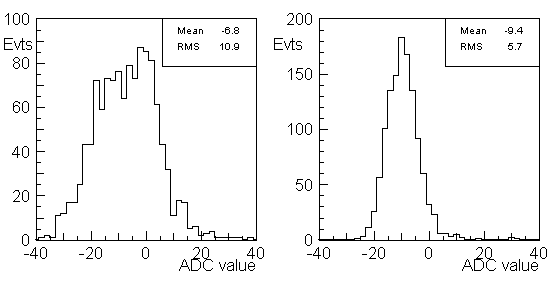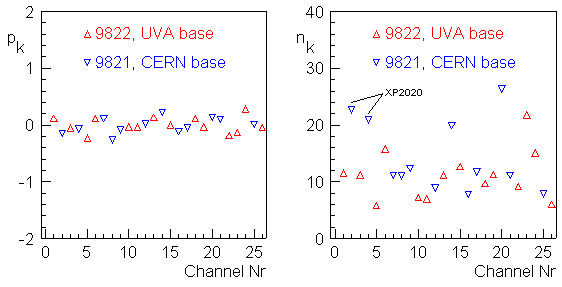





1. The pedestal and noise of an individual crystal channel, which depends on the PMT and the electronics, including splitter, ADC etc. for that particular channel and
2. the "common mode", which is noise affecting all the channels simultaneously.
The common mode value is calculated by summing all the channels, distinguishing between the two PMT-types that were used: EMI 9821Q with bases of type 4244 from CERN (called CERN bases) and EMI 9822QB with bases developed at University of Virginia (called UVA bases). The modules surrounding the crystal with the maximum ADC-value, i.e. which was hit by a photon, are excluded for common mode calculation (Fig. 6.6).


where pk, nk are pedestal (mean value) and noise value (standard deviation or rms-value) of crystal k; ak is the ADC-value for event i of channel k and m is the number of events of one run. The pedestal value pk is subtracted from each ADC-value in the second iteration. Fig. 6.7 shows pedestals and noise for run 166.
In order to correct the data from noise contributions, individual thresholds for each of the crystals are used: An ADC-value ak of a crystal k is accepted as data if
ak>4·nk. (6.12)
For most of the crystals the noise is about 10 ADC-channels (Fig. 6.7 right); the threshold is thus around 40 ADC channels, which corresponds to 2 MeV.
In order to select showers fully contained in the array of 26 crystals, an additional veto condition is defined. The condition requires that the ADC-values of the 12 outer crystals (C1-C6, C12, C13, C19-C26, see Fig. 5.11) are below the noise value in the particular channel:
ak<4·nk, for k=1-6, 12, 13, 19-26. (6.13)




